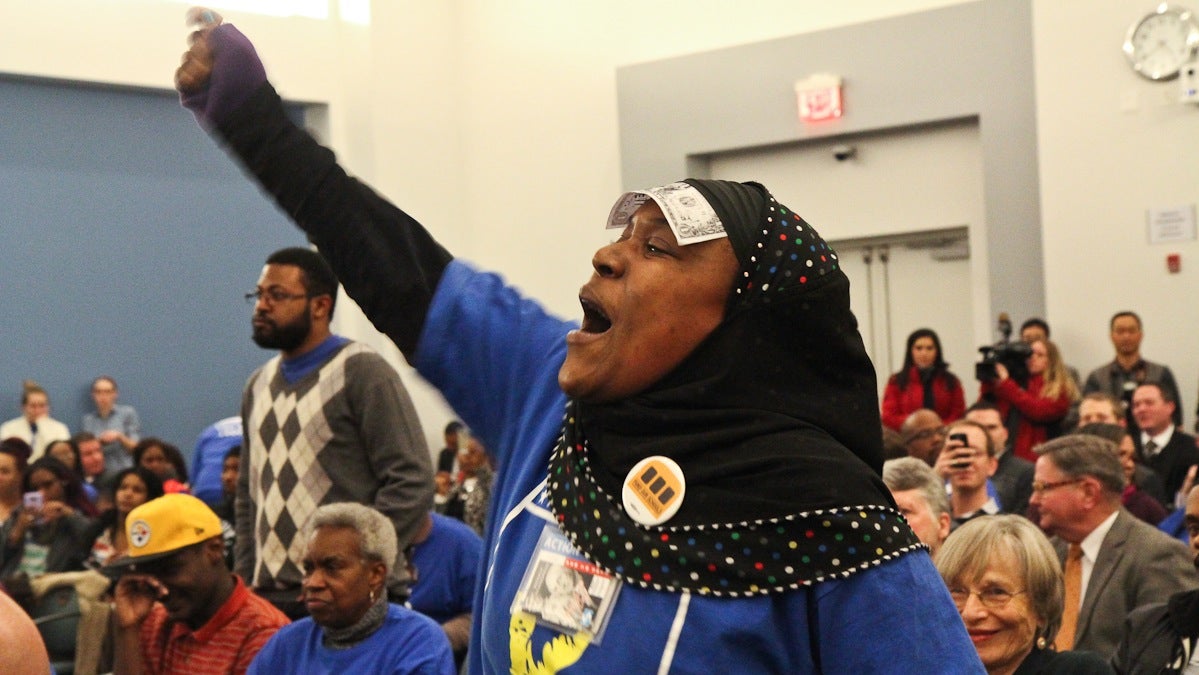SRC approves new schools with no money. What would Thurgood say?
Listen
Tyesha Anderson protests charter expansion at Wednesday's charter hearings. (Kimberly Paynter/WHYY)
Just as in the time of Thurgood Marshall, impoverished black children were caught in a struggle between the haves and the have-nots. And just as in the time of Thurgood Marshall, powerful interests were jealously guarding their advantage.
On Wednesday I moderated a WHYY forum featuring a panel of black scholars talking about Thurgood Marshall, a lawyer who fought Jim Crow head on, eventually winning Brown vs. the Board of Education of Topeka Kansas, the U.S. Supreme Court case which desegregated schools—in theory, at least.
While I was moderating that forum, which traced the real life drama of education and race in America, another spectacle played out less than five miles from where I was speaking.
Just as in the time of Thurgood Marshall, impoverished black children were caught in a struggle between the haves and the have-nots. And just as in the time of Thurgood Marshall, powerful interests were jealously guarding their advantage.
But this was not a clapboard schoolhouse in backwoods Mississippi. This was the headquarters of the Philadelphia School District, where the School Reform Commission (SRC) was about to approve 5 of 39 new charter school applications.
The SRC approved Independence West Charter School, which is set to open a k-to-4 school in 2016; Mastery Charter’s k-to-5 Gillespie campus, which is set to open in 2016; MaST, Roosevelt campus, which is set to open in 2016; TECH-Freire, a 9-to-12 school in North Philadelphia, which is set to open in 2016; and KIPP Dubois, a 9-to-12 school set to open in the fall.
Perhaps the new schools would be palatable if the School Dstrict had the money to fund them, but the School District will likely face an $80 million deficit in the coming fiscal year, and cannot fund the schools it already has.
How did we get to the point where we can’t fund Philadelphia education? Some say it is because of financial mismanagement at the School District. Others say it is because of former Gov. Tom Corbett’s decision to cut the Charter School Reimbursement, which has added to what has become a yearly ritual of education deficits. But beneath all that, there is something else at play—money.
The School District of Philadelphia has a $2.6 billion budget. The public schools are funded with tax money, and there are those who believe that tax money should be funneled to private companies or non-profits to run charter schools. Some of those people are here in Philadelphia, and others are in Harrisburg.
Those people are clearly winning, and here’s why.
When Philadelphia needed money for its last school financial crisis, our representatives went to Harrisburg, hat in hand, to request the state’s permission to raise school funding with a new $2-per-pack cigarette tax. The state eventually allowed Philadelphia to put the tax in place, but added conditions.
The District had to accept new charter applications. And charter school operators whose applications were rejected could appeal to the state Charter Appeal Board in Harrisburg.
And so, on Wednesday night, in a raucous meeting at School District Headquarters, a School District with no money was forced to entertain new charter school applications when it can’t fund the schools it already has. The SRC rejected 34 of those applications, but that could be for naught, because rejected applicants can go to Harrisburg, which can force Philadelphia to open new charter schools. And here’s the best part. We don’t know if Harrisburg will fund the schools they force us to open.
Meanwhile, many schools have no libraries, or librarians, or other needed resources, and our children continue to flood the school to prison pipeline.
This reminds me of the battle that Thurgood Marshall fought over education, and it makes me wonder if he actually won that fight.
Segregation in schools is as pervasive as it’s ever been, and it never really ended in Philadelphia, because with 14 percent white children in our city’s public schools, it’s clear that many white families simply took their children and left.
They left us with a district that is perpetually underfunded. They left us with buildings half empty and in disrepair. They left us with no paper and too few books. They left us with a school system that is vulnerable to those who would gut it for their own profit.
Are we better off now that our schools are desegregated? In some ways, yes we are.
But I believe if Thurgood Marshall could look at us now, and see what our schools have become, he would, like many of us, be heartbroken.
Listen to Solomon Jones M-F 7 to 10a on 900 am WURD
WHYY is your source for fact-based, in-depth journalism and information. As a nonprofit organization, we rely on financial support from readers like you. Please give today.


